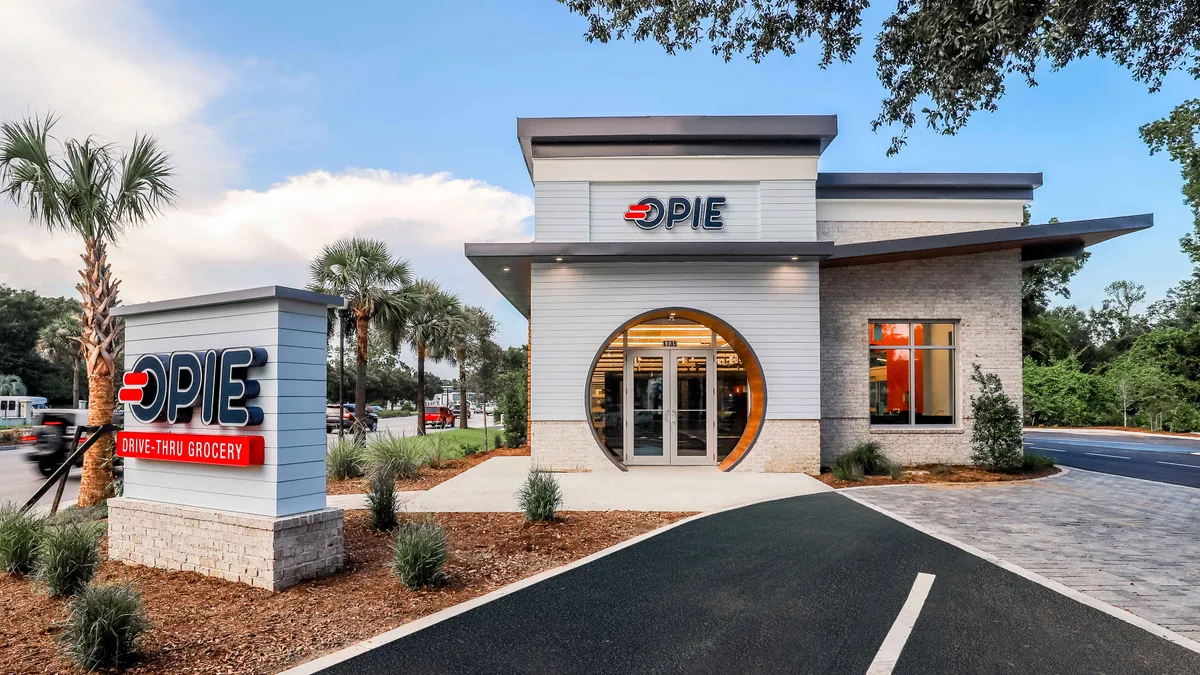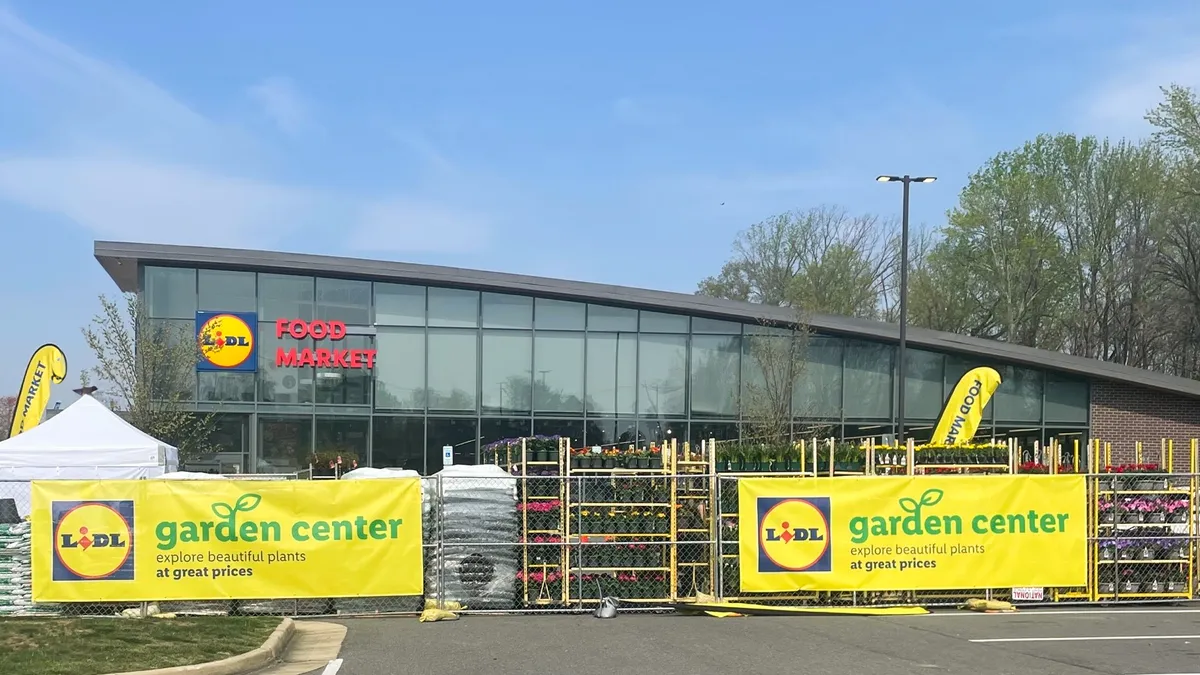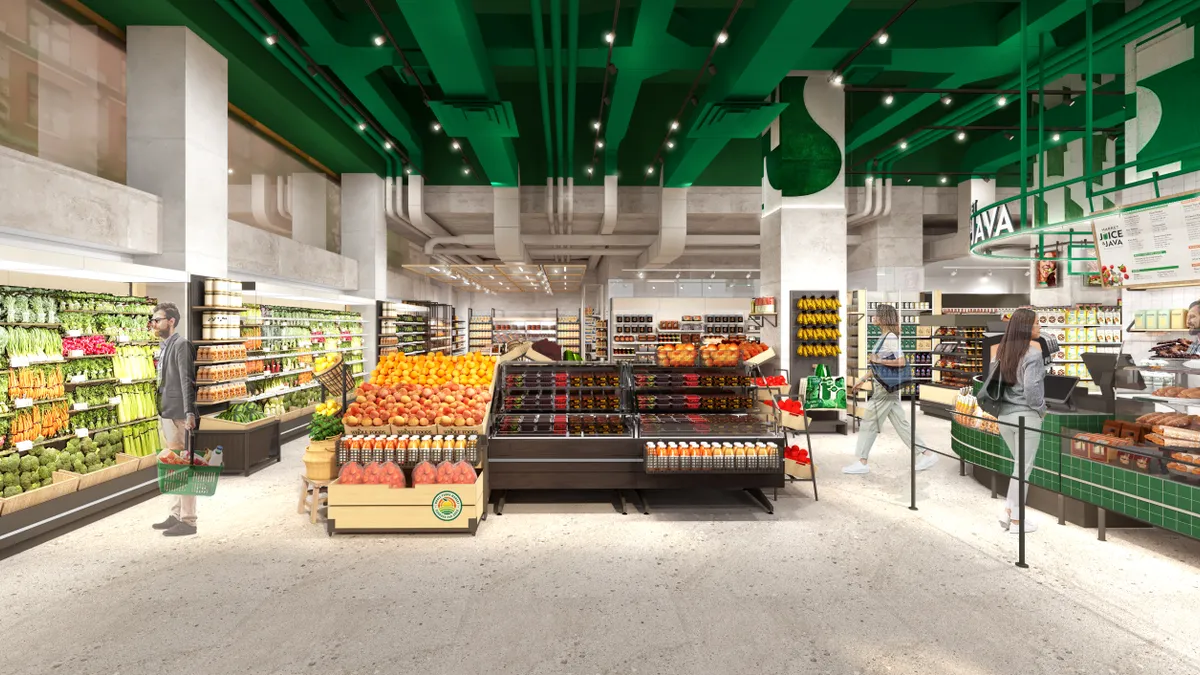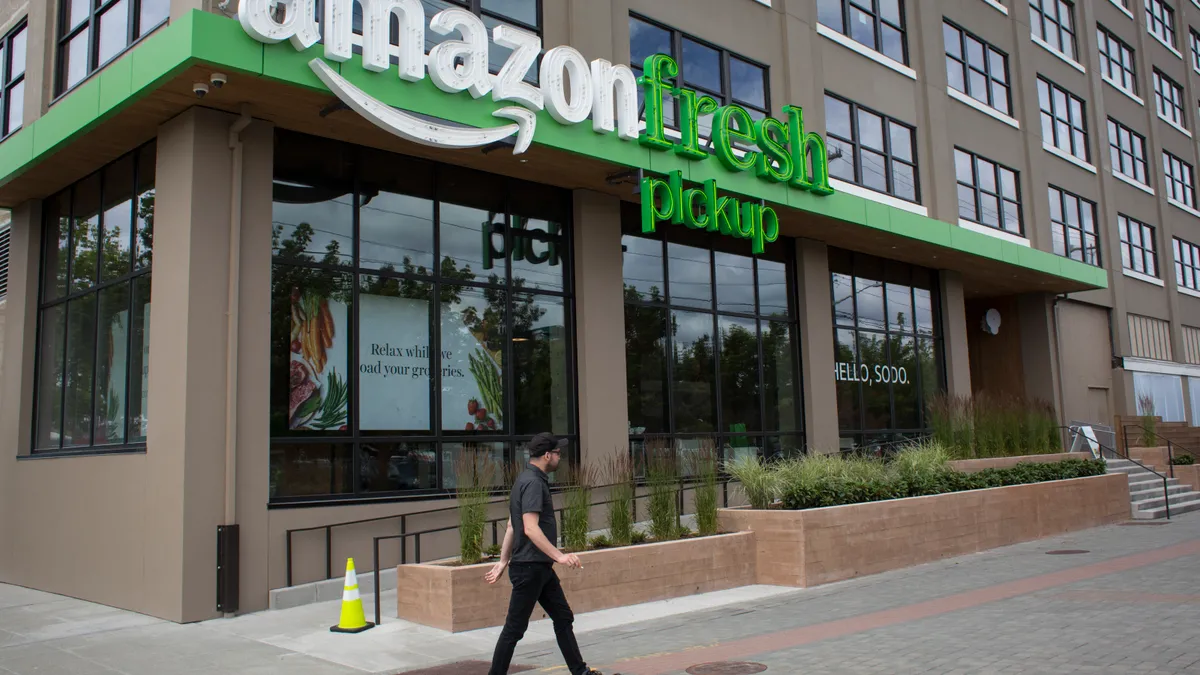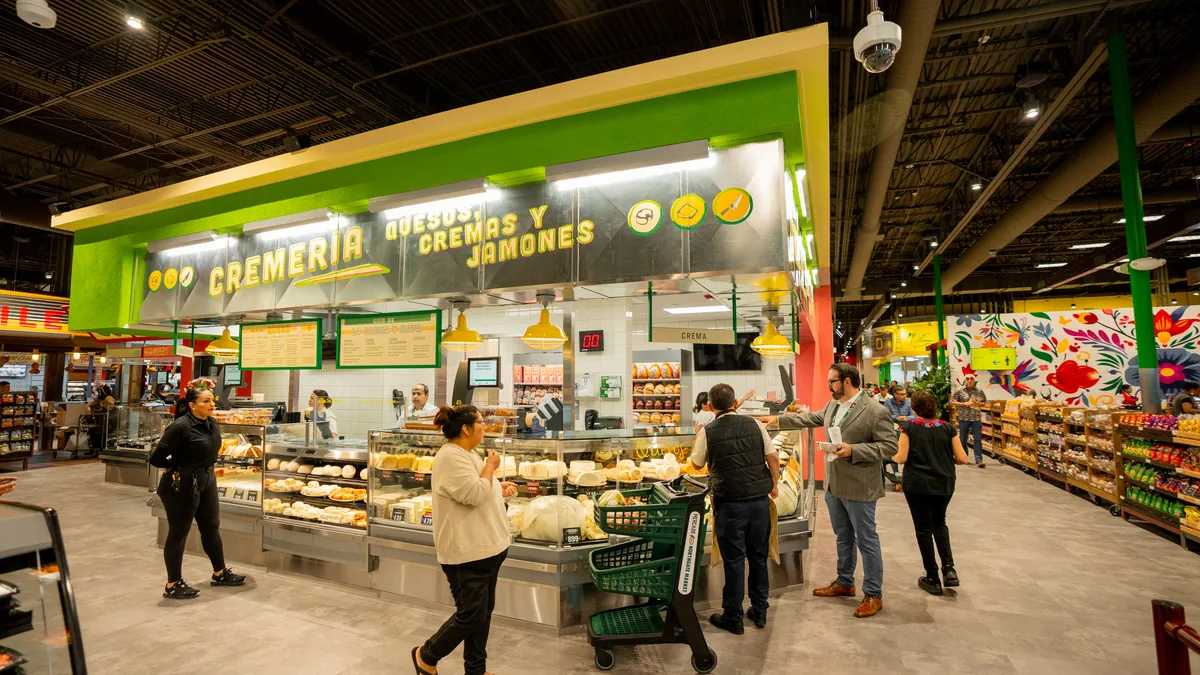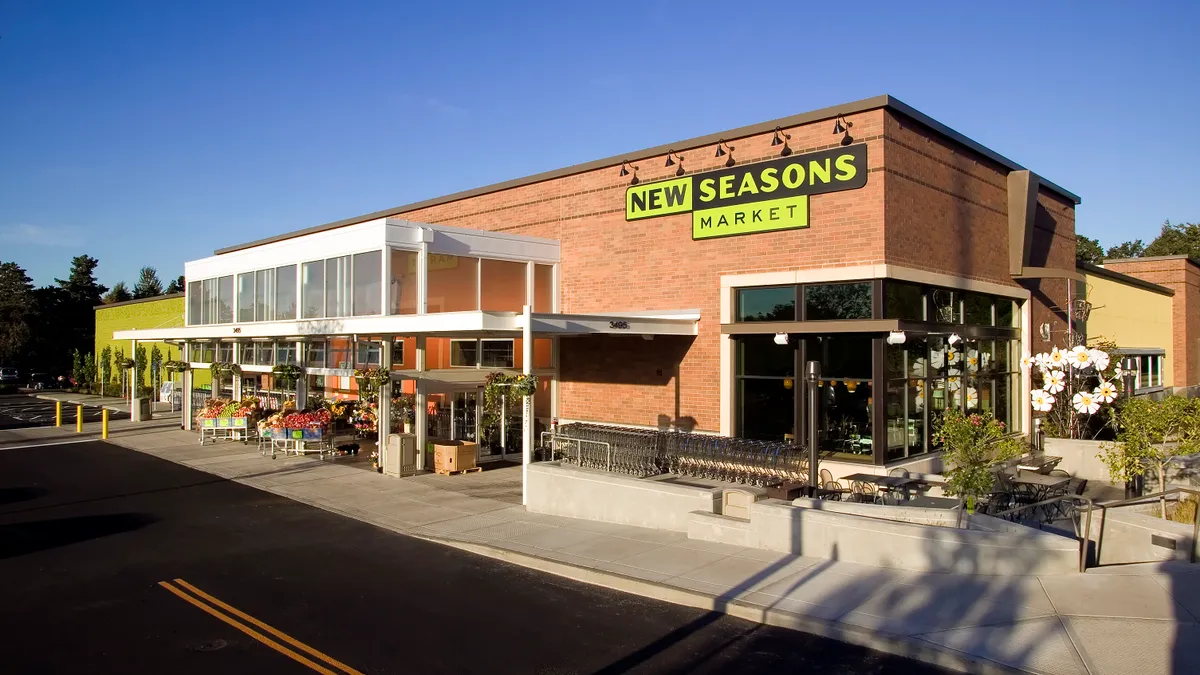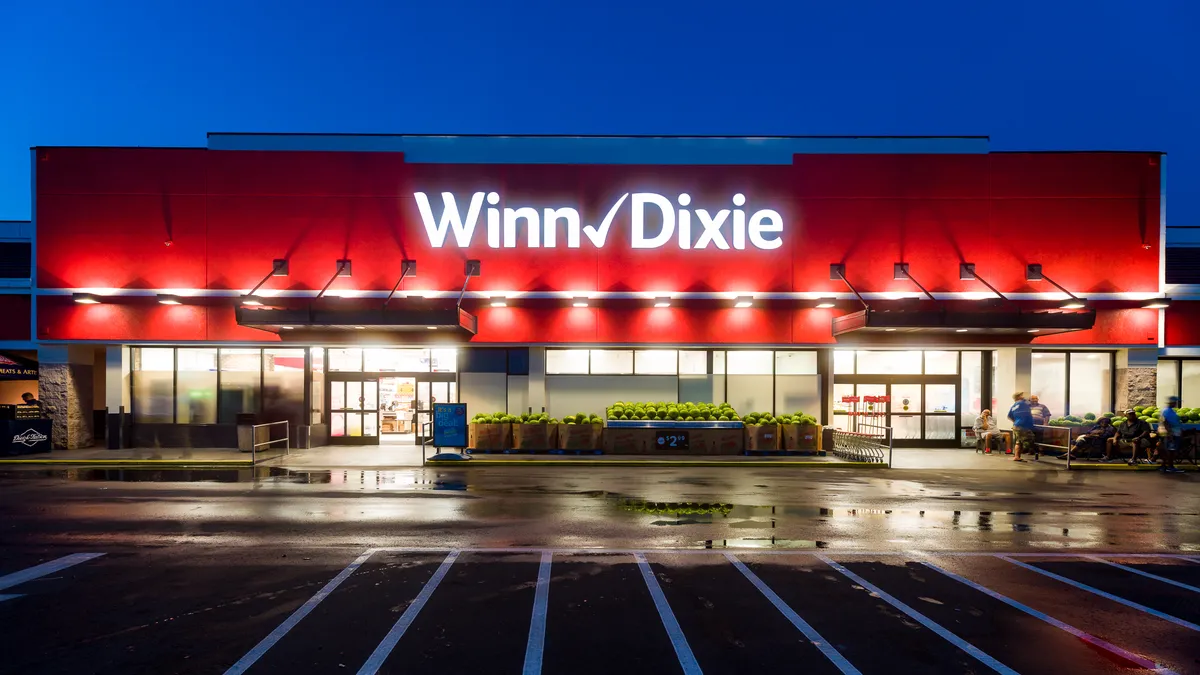Motorists cruising along U.S. Highway 17 in Mount Pleasant, South Carolina, could easily conclude the new roadside structure with signs that say "Opie" is just another place to grab a quick meal.
But people who venture into the parking lot to take a closer look will discover that while the building is indeed filled with things to eat, the choices it offers include orange juice, fresh meat and organic produce — not burgers, fries and milkshakes.
Welcome to Opie Drive-Thru Grocery, a pickup-only grocery store that aims to marry the speed and convenience of an always-open fast food restaurant with the broad assortment of household provisions shoppers look to a supermarket to find.
The store, which officially opened Oct. 5 and operates 24 hours a day, is essentially a dark store intended expressly to rapidly fulfill grocery orders for customers while they wait in their vehicle. Employees walk up to drivers as they arrive and retrieve each customer's purchases from the 3,000-square-foot custom-built facility.
Located just outside Charleston, South Carolina, the store doesn't have a pickup window or order counter. Instead, shoppers use a smartphone app to either make their selections in advance or while in a parking spot outside the store. They can also simply tell a staff member what they'd like, similar to ordering fast food. Only electronic payments are accepted.
"Our job is to be like a train station. You want to get to your destination, but you're making a quick stop on the way," said store director Scott Thomas, who joined Opie from Chick-fil-A, where he helped launch more than a dozen locations.
Orders fulfilled in minutes
Pickup has emerged as a key e-commerce driver for grocers in recent years as they focus on convenience, with companies paying particular attention to building their capacity to let shoppers collect orders at stores without leaving their vehicles.
Last year, some retailers, like Giant Eagle, Kroger and Whole Foods, converted a handful of stores to pickup-only service as they sought to keep up with surging demand spurred by the pandemic. Grocers including Albertsons have been experimenting with unattended pickup lockers, while Amazon and Walmart have tested pickup-only locations in the past.
What makes Opie unique is its speed of service, with orders ready minutes after they're placed. According to Opie co-founder Tyler Sones, workers have been able to pick smaller orders in as little as 90 seconds, and can fulfill baskets with 30 or more items in approximately six minutes.
"When it comes to groceries, people [often] make the decision that they need something now. You know, 'we're out of milk and we need batteries for the remote,'" Sones said. "So that was really where the idea grew, and then we started going down this path of trying to put the pieces together."
While the majority of the orders Opie receives are from customers who make their selections in advance, about 30% are placed by people who drive up and say what they want on the spot, according to Sones. So far, shoppers who place those "express" orders are typically buying more than the four or five items the company had anticipated those customers would request, in part because alcohol sales have been brisk, he said.
"You definitely have a sub-market there specifically of people just coming in and saying, 'I want to pick up a six-pack, and my wife needs me to grab some eggs for breakfast tomorrow,'" Sones said.
These shoppers generally know precisely what they are looking for when they pull up, which is helpful because it's impractical to list the grocery store's wares on a menu like fast food restaurants do with their offerings, Sones said. "Obviously, one of the challenges that you have with drive-thru grocery is ... [customers] can't just say, 'I want a number four,'" as someone might when placing an order at a fast food outlet, he said.
Opie depends on a team of four or five workers per shift to handle order fulfillment, stocking and other tasks, Sones said. So far, the store's busiest time of day has been between 4 p.m. and 8 p.m.
The store carries about 5,000 SKUs, including dairy products, baked goods, fresh meat and pre-packaged deli items, Sones said, and about 40% of the products the store stocks are natural or organic. The store also offers wraps and salads, coffee supplied by a local roaster and drinks from a soda fountain, he said, and might add private label items down the road.
Opie worked with its main grocery suppliers, United Natural Foods, Inc. and Merchants Distributors, to determine what items to stock initially, and will look at how sales unfold during the coming weeks to more precisely match its assortment to people's shopping habits, Sones said. The company has already seen that it is selling more milk than expected and found that some shoppers tend to stop by for groups of items that go together, like pancake mix and syrup or bacon and eggs.
Competitive prices and 'delightful' service
Sones said Opie's founders concluded when they launched the business in 2019 that the suburban area the store serves is better suited to pickup than it is to delivery.
"When people are spread out, delivery becomes very expensive, and we said, 'you know what, people are already in their car, they're going places, so we're going to offer this as a drive-thru,'" he said. "And then obviously the dark store model lets us pick very, very quickly."
Beyond offering a comprehensive, if limited, assortment of groceries, Opie is trying to keep its prices competitive with the traditional food retailers it competes with, which include Walmart, Target and Publix, according to Sones.
In addition, Opie does not charge fees or have a minimum order requirement, relying instead on the cost savings it realizes from not operating a traditional grocery store to help make its business model work.
"People definitely come in expecting convenience store pricing, and they're surprised … that our prices are very much in line with traditional retail," Sones said.
Despite its emphasis on getting customers on their way rapidly, Opie — which is named after the child character on the 1960s television program "The Andy Griffith Show" — is paying close attention to what shoppers experience during the short time they are on its premises. Staff members wear matching shirts and hats, and music from the 1950s plays in the background.
"We really want to make sure that when you're there we make it as pleasant and as delightful as possible," said Thomas.
Sones said Opie considered several areas of the United States before opting to put its first store in the Charleston area, including suburbs near Salt Lake City and in Texas and North Carolina. The company, which is backed by a private investor based in Jackson, Wyoming, intends to open a second store next year in Summerville, South Carolina, and is also planning two additional locations in the state.
Opie has received interest from municipalities and investors interested in helping it grow further, and is open to suggestions for how to improve its approach to selling groceries, Sones added.
"A lot of what happens next will be depending on if we pursue … franchisees or partners on an individual store level, or if we partner with somebody bigger to try to grow to a bunch of locations. We haven't crossed that horizon yet," he said.



